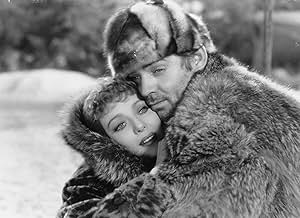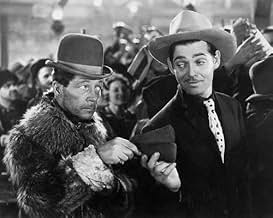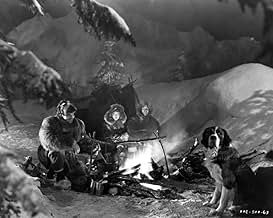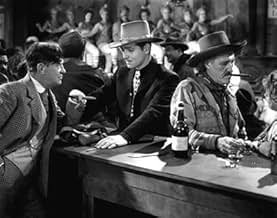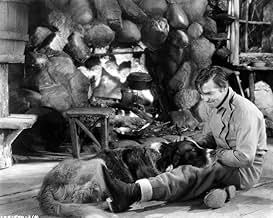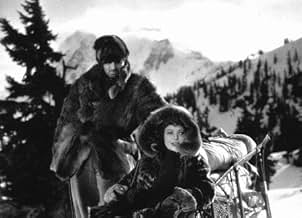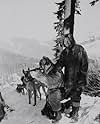IMDb RATING
6.8/10
2.8K
YOUR RATING
During the Klondike Gold Rush, a traveler purchases a dog to lead the way toward the treasure, but reconsiders his journey when he finds a stranded widow.During the Klondike Gold Rush, a traveler purchases a dog to lead the way toward the treasure, but reconsiders his journey when he finds a stranded widow.During the Klondike Gold Rush, a traveler purchases a dog to lead the way toward the treasure, but reconsiders his journey when he finds a stranded widow.
- Director
- Writers
- Stars
- Awards
- 1 win total
Thomas E. Jackson
- 'Tex' Rickard
- (as Tommy Jackson)
George MacQuarrie
- Mounted Policeman
- (as George McQuarrie)
C.E. Anderson
- Fourth Poker Player
- (uncredited)
Edwin Argus
- Dawson Townsman
- (uncredited)
William Arnold
- First Faro Player
- (uncredited)
- Director
- Writers
- All cast & crew
- Production, box office & more at IMDbPro
Featured reviews
The Yukon Gold Rush: A savage dog and a lonely man each respond to THE CALL OF THE WILD, that primordial release of primitive urges, in their own way.
It should be understood immediately that this movie only borrows the title and a few incidents from Jack London's classic novel. And at that point the comparison between the two should end. This film, rousing & adventurous, is able to stand on its own merits. An excellent cast, fine production values (notice particularly the care with which Skagway & Dawson are depicted) and location shooting in Washington State are the film's strongest assets. The plot, meant solely for entertainment, is pure hokum...
Clark Gable brings his trademark masculinity to a role that didn't require a lot of stretching of his thespian muscles. But in essentially playing himself he is perfectly cast. One cannot overcome the suspicion that London's original story was reworked for the star. Gable had been through this before - remote setting, forces of nature, beautiful woman, adultery. Think RED DUST in the snow.
Loretta Young is the beautiful woman. From scene to scene, no matter what the hardship, she remains living proof that a first class Hollywood makeup job can withstand the worst ravages of the Klondike. This is perhaps too harsh. Like Gable, little more is required of her than to exude physicality. She is indeed a treat to the eyes, even if her inclusion in the plot is patently ludicrous. (The on screen attraction between Gable & Young wasn't faked. A daughter, ostensibly 'adopted' by Young in France, would be the result.)
As Gable's sidekick, comic Jack Oakie has one of his best screen roles. Getting to play most of his scenes strictly for laughs, he adds chuckles to the story which, one assumes, would have outraged London.
Twisting his usual pomposity to a sinister bent, English character actor Reginald Owen is memorable as the film's villain. Dangerously wicked, he makes us want to know more about this man called Smith, with money to burn and a raging temper. The screenplay, wisely, leaves his biography up to the imagination of the viewer.
Sidney Toler & Herman Bing are very good in small roles. Movie mavens will recognize Arthur Housman, veteran of many Laurel & Hardy comedy shorts, as a Skagway drunk with a surprisingly mean punch.
The affection between Gable and Buck, the great St. Bernard with whom he shares so many scenes, is obvious.
It should be understood immediately that this movie only borrows the title and a few incidents from Jack London's classic novel. And at that point the comparison between the two should end. This film, rousing & adventurous, is able to stand on its own merits. An excellent cast, fine production values (notice particularly the care with which Skagway & Dawson are depicted) and location shooting in Washington State are the film's strongest assets. The plot, meant solely for entertainment, is pure hokum...
Clark Gable brings his trademark masculinity to a role that didn't require a lot of stretching of his thespian muscles. But in essentially playing himself he is perfectly cast. One cannot overcome the suspicion that London's original story was reworked for the star. Gable had been through this before - remote setting, forces of nature, beautiful woman, adultery. Think RED DUST in the snow.
Loretta Young is the beautiful woman. From scene to scene, no matter what the hardship, she remains living proof that a first class Hollywood makeup job can withstand the worst ravages of the Klondike. This is perhaps too harsh. Like Gable, little more is required of her than to exude physicality. She is indeed a treat to the eyes, even if her inclusion in the plot is patently ludicrous. (The on screen attraction between Gable & Young wasn't faked. A daughter, ostensibly 'adopted' by Young in France, would be the result.)
As Gable's sidekick, comic Jack Oakie has one of his best screen roles. Getting to play most of his scenes strictly for laughs, he adds chuckles to the story which, one assumes, would have outraged London.
Twisting his usual pomposity to a sinister bent, English character actor Reginald Owen is memorable as the film's villain. Dangerously wicked, he makes us want to know more about this man called Smith, with money to burn and a raging temper. The screenplay, wisely, leaves his biography up to the imagination of the viewer.
Sidney Toler & Herman Bing are very good in small roles. Movie mavens will recognize Arthur Housman, veteran of many Laurel & Hardy comedy shorts, as a Skagway drunk with a surprisingly mean punch.
The affection between Gable and Buck, the great St. Bernard with whom he shares so many scenes, is obvious.
If you are a lover of Jack London's CALL OF THE WILD, then you probably should skip this film, as it takes a lot of liberties with the book. In many ways, the original story is really forgotten and it's only a very rough approximation of the book. So, as a rendition of the original it stinks. BUT, if you ignore the book and just watch it for the fun of it and let go of your preconceptions, it's a wonderful film for anyone except Literature teachers.
Clark Gable is at his best and Loretta Young is absolutely beautiful in the film. While I never thought she was one of the prettiest actresses, the cinematographer really did his work and make her look radiant (I mean that in a good way--not in the CHARLOTTE'S WEB way). Jack Okie is fine as the loyal friend and the movie strongly concentrates on people and not the dog--now that's an interesting choice, huh? Overall, one of the better adventure films of the era and well worth watching.
Clark Gable is at his best and Loretta Young is absolutely beautiful in the film. While I never thought she was one of the prettiest actresses, the cinematographer really did his work and make her look radiant (I mean that in a good way--not in the CHARLOTTE'S WEB way). Jack Okie is fine as the loyal friend and the movie strongly concentrates on people and not the dog--now that's an interesting choice, huh? Overall, one of the better adventure films of the era and well worth watching.
The beginning of Call of the Wild (a very loose adaptation of Jack London's novel of the same name) is made up of hard to decipher plot set up exposition which I was only able to get my head around until my third viewing; surely there could have been a more interesting and engaging way the film could have delivered all this information to the viewer. Likewise, a scene during the beginning of the film in which Jack Thornton (Gable) returns to his room only to find his love interest (and possible prostitute) Marie (Katherine deMille) having an affair with another man doesn't appear to have any effect on the rest of the plot. According to TCM originally Marie had an earlier scene but this was cut from the original print of the film. After this rather static opening, the film gets rolling and finds one of its emotional cores.
Call of the Wild is one of the best dog movies with its complex relationship and emotional bond between Gable and the Saint Bernard named Buck, one majestic looking beast. Buck is a dog that would be of no use to Jack yet is willing to pay $250 to save its life. The image Gable hugging the pooch tells more than words can; truly man's best friend.
Arguably the most powerful scene in the film is that of Buck trying to pull 1,000 pounds as the result of a bet. You couldn't ask for a more powerful and barbaric display of willpower knowing if he doesn't succeed his life will be taken. The dog in the film appears to be legitimately struggling regards the weight it is actually carrying in real life. Much of the scenes in Call of the Wild featuring dogs would never make it to screen today due to the unethical treatment of animals which is more than apparent on screen. Near the beginning of the film two dogs fight each other on screen and uncut which today would ether to edited to create the illusion of a fight or with horribly unconvincing CGI. Likewise, the general handling of the dogs and even the use of an actual rabbit as bait for dogs to hunt creates a gritty and brutal realism on screen which could not be replicated today.
Reginald Owen is the show stealer as Mr. Smith, the posh, sinister English gentleman with a sick vendetta against a dog; those ridiculous magnified eyes give him the look of a madman. Likewise, Jack Oakie as Shorty comes off to me as an uncowardly version of the Cowardly lion, even down to that laugh. Shorty was killed off in the original cut of the film, as evident from the foreshadowing of his dice turning up snake eyes after Gable throws them to him. The new ending in which Shorty and Jack are reunited prevents the film from being darker in vein like The Treasure of the Sierra Madre.
It took me a long time to get the appeal of Loretta Young but I gradually came to see her immense likeability, partially in due to those gazing, soulful eyes. In Call of the Wild her makeup is applied flawlessly despite being stuck in the freezing cold wilderness but she's still she's a tough cookie who can lecture Gable on a thing or two. I love a good man and woman alone in the wilderness film in which their chemistry fully shines through and the process of falling in love happens organically which in this instance may have been aided by Gable and Young's affair they had during the production which bore a child named Judy. In a moment of art imitating life Shorty even says; "You know I know a couple of people who used to fool around like that and they got children now".
I like this sub-genre of the northern western, a refreshing alternative to the mundanity I can often experience in traditional westerns. This is aided by the extensive use of location shooting present in Call of the Wild with those beautiful mountains, silhouetted trees and all that gleaming white snow - I don't believe there could be a better natural light reflector than the white stuff.
Call of the Wild is one of the best dog movies with its complex relationship and emotional bond between Gable and the Saint Bernard named Buck, one majestic looking beast. Buck is a dog that would be of no use to Jack yet is willing to pay $250 to save its life. The image Gable hugging the pooch tells more than words can; truly man's best friend.
Arguably the most powerful scene in the film is that of Buck trying to pull 1,000 pounds as the result of a bet. You couldn't ask for a more powerful and barbaric display of willpower knowing if he doesn't succeed his life will be taken. The dog in the film appears to be legitimately struggling regards the weight it is actually carrying in real life. Much of the scenes in Call of the Wild featuring dogs would never make it to screen today due to the unethical treatment of animals which is more than apparent on screen. Near the beginning of the film two dogs fight each other on screen and uncut which today would ether to edited to create the illusion of a fight or with horribly unconvincing CGI. Likewise, the general handling of the dogs and even the use of an actual rabbit as bait for dogs to hunt creates a gritty and brutal realism on screen which could not be replicated today.
Reginald Owen is the show stealer as Mr. Smith, the posh, sinister English gentleman with a sick vendetta against a dog; those ridiculous magnified eyes give him the look of a madman. Likewise, Jack Oakie as Shorty comes off to me as an uncowardly version of the Cowardly lion, even down to that laugh. Shorty was killed off in the original cut of the film, as evident from the foreshadowing of his dice turning up snake eyes after Gable throws them to him. The new ending in which Shorty and Jack are reunited prevents the film from being darker in vein like The Treasure of the Sierra Madre.
It took me a long time to get the appeal of Loretta Young but I gradually came to see her immense likeability, partially in due to those gazing, soulful eyes. In Call of the Wild her makeup is applied flawlessly despite being stuck in the freezing cold wilderness but she's still she's a tough cookie who can lecture Gable on a thing or two. I love a good man and woman alone in the wilderness film in which their chemistry fully shines through and the process of falling in love happens organically which in this instance may have been aided by Gable and Young's affair they had during the production which bore a child named Judy. In a moment of art imitating life Shorty even says; "You know I know a couple of people who used to fool around like that and they got children now".
I like this sub-genre of the northern western, a refreshing alternative to the mundanity I can often experience in traditional westerns. This is aided by the extensive use of location shooting present in Call of the Wild with those beautiful mountains, silhouetted trees and all that gleaming white snow - I don't believe there could be a better natural light reflector than the white stuff.
Jack London's novel The Call Of The Wild is pretty much ignored in this 1935 adaptation. The title remains the same and there IS a dog named Buck involved in parts of the action, but apart from that the similarities are virtually non-existent. Far greater emphasis is placed on the human characters in the film than in the book. One has to assume that the film was written as a vehicle for Clark Gable, a big outdoor adventure yarn in which the star could get in to and out of a variety of hair-raising escapades in the frozen wilderness. The fact that London's novel is essentially an animal story with a few human characters passing through the narrative is of little significance to scripter Gene Fowler and director William Wellman. That's not to say The Call Of The Wild is a disposable film; the unusual and expensive decision to film on genuinely cold, mountainous locations (Washington state standing in for Yukon) shows that this was envisaged as a serious box office winner.
Struggling gold prospector Jack Thornton (Gable) and his goofy sidekick Shorty Hooliham (Jack Oakie) travel around the Yukon in the 19th Century, searching for an elusive gold strike that will make them richer than rich. They are helped in their adventures by a St Bernard dog named Buck. Also busily scouring the land for gold is the sinister English-man Smith (Reginald Owen), a cruel rival who has a mysterious past and even a little history with Thornton's dog. During their wanderings, Jack and Shorty come across a woman called Claire Blake (Loretta Young) whose husband has gone missing in the snowfields and could be dead. Claire teams up with Jack, Shorty and Buck, but it isn't long before she finds herself falling for Thornton's roguish charm, even though she cannot be sure if her husband is dead or alive.
The movie is very enjoyable in its old-fashioned way. I'm a believer in the theory that films should try to be faithful to their source material, at least to a reasonable extent, so in some ways I felt dismayed at the lack of respect towards London's original story. However, once I'd got that small irritation out of my system I found The Call Of The Wild a perfectly likable star vehicle. Gable is solid in a role that asks little of him other than to appear rugged and fearless. Owen is very good as the villain of the piece, while Young shares a good chemistry with the hero (in real-life, she and Gable were lovers). Jack Oakie is the least impressive of the key actors, mugging rather embarrassingly as the inevitable comical sidekick. The location work in Washington state adds a sense of authenticity to the film that is very uncommon for a movie made in the studio-bound '30s. On the negative side, though, the film settles for a very convenient ending which ditches plausibility so that the course of true love and personal success can run smoothly (indeed, IMPROBABLY smoothly) for the main protagonists. Of its type and era, however, The Call Of The Wild is watchable and entertaining fare.
Struggling gold prospector Jack Thornton (Gable) and his goofy sidekick Shorty Hooliham (Jack Oakie) travel around the Yukon in the 19th Century, searching for an elusive gold strike that will make them richer than rich. They are helped in their adventures by a St Bernard dog named Buck. Also busily scouring the land for gold is the sinister English-man Smith (Reginald Owen), a cruel rival who has a mysterious past and even a little history with Thornton's dog. During their wanderings, Jack and Shorty come across a woman called Claire Blake (Loretta Young) whose husband has gone missing in the snowfields and could be dead. Claire teams up with Jack, Shorty and Buck, but it isn't long before she finds herself falling for Thornton's roguish charm, even though she cannot be sure if her husband is dead or alive.
The movie is very enjoyable in its old-fashioned way. I'm a believer in the theory that films should try to be faithful to their source material, at least to a reasonable extent, so in some ways I felt dismayed at the lack of respect towards London's original story. However, once I'd got that small irritation out of my system I found The Call Of The Wild a perfectly likable star vehicle. Gable is solid in a role that asks little of him other than to appear rugged and fearless. Owen is very good as the villain of the piece, while Young shares a good chemistry with the hero (in real-life, she and Gable were lovers). Jack Oakie is the least impressive of the key actors, mugging rather embarrassingly as the inevitable comical sidekick. The location work in Washington state adds a sense of authenticity to the film that is very uncommon for a movie made in the studio-bound '30s. On the negative side, though, the film settles for a very convenient ending which ditches plausibility so that the course of true love and personal success can run smoothly (indeed, IMPROBABLY smoothly) for the main protagonists. Of its type and era, however, The Call Of The Wild is watchable and entertaining fare.
The last time Clark Gable got loaned out for a film was the year before and he won an Academy Award. This time Louis B. Mayer got a good price for him from Fox for Call of the Wild.
Fox also did something unusual in that the film was shot on location with the mountains of Washington state serving as the Canadian Rockies. Some really stunning cinematography is done for this film, especially in the river scenes. Too bad color was not in use back then.
Watching Gable, Loretta Young, and Jack Oakie on a raft pulling it to shore in what must have been freezing water reminded me so much of the stunts Gable did for The Misfits. Of course back then he had the youth and vim and vigor to do such things.
The film served as the meeting place for Gable and Young they carried on a torrid affair that resulted in Loretta Young giving birth. Back then it would have been a career death sentence for a star to give birth to an out of wedlock daughter, especially for the very Catholic Ms. Young. A whole elaborate charade was concocted with Loretta adopting her own daughter as a single mom.
No Oscars this time for Gable, but a good strong performance as a rugged prospector up in the Klondike during the gold rush. Of course being involved with Loretta sure helped in the love scenes. Young plays a woman apparently abandoned in the snow by her husband who's presumed dead.
Jack Oakie as Gable's sidekick and Reginald Owen as the English villain engaged in some claim jumping are the best two of the supporting actors. Of the human variety.
Then there's Buck, Gable's trusty St. Bernard who he rescues from Reginald Owen. In that rugged country good sled dogs can come in mighty handy and Buck sure proves his worth. Up there, they are indeed man's best friend.
Fox also did something unusual in that the film was shot on location with the mountains of Washington state serving as the Canadian Rockies. Some really stunning cinematography is done for this film, especially in the river scenes. Too bad color was not in use back then.
Watching Gable, Loretta Young, and Jack Oakie on a raft pulling it to shore in what must have been freezing water reminded me so much of the stunts Gable did for The Misfits. Of course back then he had the youth and vim and vigor to do such things.
The film served as the meeting place for Gable and Young they carried on a torrid affair that resulted in Loretta Young giving birth. Back then it would have been a career death sentence for a star to give birth to an out of wedlock daughter, especially for the very Catholic Ms. Young. A whole elaborate charade was concocted with Loretta adopting her own daughter as a single mom.
No Oscars this time for Gable, but a good strong performance as a rugged prospector up in the Klondike during the gold rush. Of course being involved with Loretta sure helped in the love scenes. Young plays a woman apparently abandoned in the snow by her husband who's presumed dead.
Jack Oakie as Gable's sidekick and Reginald Owen as the English villain engaged in some claim jumping are the best two of the supporting actors. Of the human variety.
Then there's Buck, Gable's trusty St. Bernard who he rescues from Reginald Owen. In that rugged country good sled dogs can come in mighty handy and Buck sure proves his worth. Up there, they are indeed man's best friend.
Did you know
- TriviaLike many films of the era, this production was originally slated to film in the Southern Sierra Nevada near Sonora. In fact, production had already begun when a warm front melted the snow and forced a hasty and expensive move to Washington state.
- GoofsWhy call this a goof? It's just a funny way of saying he'd knife someone.
- Quotes
Jack Thornton: Me? I'll take bourbon. It kills you slower, but a lot more pleasant like.
- Alternate versionsOriginally released at 95 minutes; later cut to 81 minutes for a re-issue. For many years only the cut re-issue version was available for television showings, and it is also the version released on DVD in 2006 as part of the Clark Gable Collection. The original length version remained unseen until it was released on blu-ray in 2013.
- ConnectionsFeatured in Ta mère ou moi ! (1991)
- How long is Call of the Wild?Powered by Alexa
Details
- Runtime
- 1h 35m(95 min)
- Color
- Sound mix
- Aspect ratio
- 1.37 : 1
Contribute to this page
Suggest an edit or add missing content


